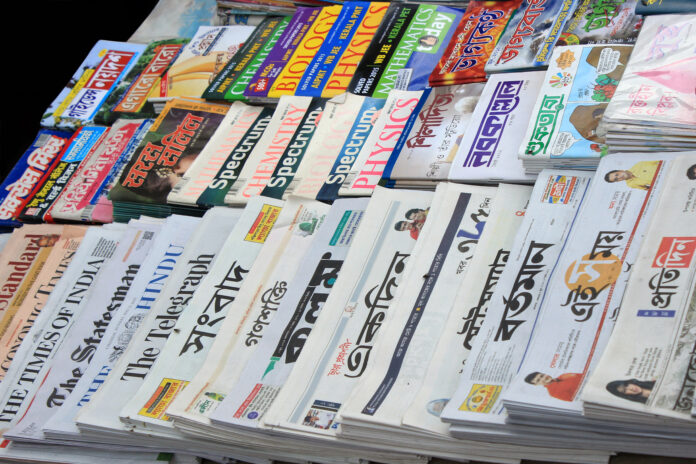Bangladeshi student Mohammad Fardin argues that by spreading ridiculous misinformation about the treatment of minorities in the new Bangladesh, Indian and international media are stoking regional tensions.
The Indian media has blown out of all proportion isolated cases of violence against Hindu minorities in Bangladesh, alleging widespread “mass killings.”
Credible sources have refuted these assertions. In fact, only two Hindus have been killed following Sheikh Hasina’s resignation in August 5 following extensive anti-regime protests, and one of them was a police officer, according to Al Jazeera.
The interim government of Muhammad Yunus has taken proactive measures to protect minority groups. And students and opposition leaders came together in their commitment to peace during a difficult period by working together to safeguard Hindu homes and places of worship.
Nevertheless, Indian media, especially those associated with the ruling BJP party, have depicted Bangladesh’s recent political shift as “promoting extremism.” Journalists such as Arnab Goswami have alleged that Bangladesh shelters “extremist organisations” and “foreign plots,” incorrectly linking protests to a U.S. “deep state” scheme.
Asif Nazrul, Bangladesh’s legal advisor, has condemned these narratives, highlighting India’s hypocrisy in light of its own history of Muslim oppression.
In contrast to these characterisations, 64.1% of Bangladeshis surveyed by Voice of America Bangla feel that minority safety has been enhanced under the new interim administration.
Subscribe to our newsletter and stay updated on the latest news and updates from around the Muslim world!
And of course the 2024 Global Risk Report from the World Economic Forum emphasises that India is the most susceptible country to misinformation, heightened by platforms such as WhatsApp.
Reuters misinformation
Recently, the international news agency Reuters has faced criticism for its erroneous coverage of the killing of a Muslim lawyer, Saiful Islam Alif, in Bangladesh.
Initially, Reuters stated that the lawyer was representing Chinmoy Kumar Das, a Hindu who was charged with sedition. Their story falsely implied that the lawyer was singled out because of his association with Das, supporting the assertions of Hindu nationalist organisations in India.
But this assertion was false. Prior to his death, Mr Alif had shared a video on Facebook endorsing the government’s accusations against Das, labelling him as seditious.
Reuters subsequently issued major corrections to its article, omitting the assertion about the lawyer’s involvement with Das and the quoted police official, Liaquat Ali. These changes, however, lacked transparency and were open to criticism.
There was no evidence of Liaquat Ali, a police officer with a Chattogram, speaking to Reuters, according to Bangladeshi officials. And there was no interaction with Reuters journalists at all, according to a statement issued by the Chattogram police.
The credibility of foreign reporting on Bangladesh has thus been called into question by this lack of accountability.
BBC Bangla errors
Exacerbating the dissemination of false information was the flawed reporting by BBC Bengali concerning the International Society for Krishna Consciousness (ISKCON).
The outlet asserted that ISKCON (a Hindutva organisation) had requested intervention from the Indian government regarding Das, referencing posts from the verified X account “Iskcon, Inc.”
But “Iskcon, Inc.” is not connected to the global ISKCON organisation or its branch in Bangladesh, according to Netra News’ inquiry.
It is linked, though, to the Krishna Consciousness Society (KCS) which was established in 2021 in Rajasthan.
ISKCON’s international child protection office stated that Das was suspended from the organisation in July 2023 over misconduct allegations by minors. And the worldwide sector of ISKCON did not ask for Indian participation, contradicting the claims made by “Iskcon, Inc.”
The error by BBC Bangla underscores the difficulties in confirming information in a time of widespread digital falsehoods.
India demonstrations
This disinformation and the inflammatory narratives had real life consequences, heightening regional tensions.
For example, demonstrations in Kolkata opposing Bangladesh’s government included flag burning and effigy destruction, breaking through police barriers and putting diplomats at risk.

The Ministry of Foreign Affairs of Bangladesh denounced the events, calling on India to safeguard its missions.
A similar incident took place on November 27 at the Assistant High Commission in Agartala, where demonstrators associated with the Hindu Sangharsh Samiti damaged property and insulted the Bangladeshi flag.
Bangladesh urged improved security, referencing breaches of the Vienna Convention on Diplomatic Relations.
Regional tensions
The spread of misinformation by Indian media threatens to harm relations between Bangladesh and India. By portraying political events in Bangladesh as perilous, such accounts alienate a neighbouring nation that has deep cultural connections to India.
The demonstrations in Kolkata and Agartala also illustrate the real effects of false information. Such actions threaten diplomatic relations and establish a risky precedent for intensifying political conflicts.
Bangladesh is at an important crossroads, working to enhance its democracy and combat misinformation. Despite the divisive narratives from Indian media, the interim government led by Nobel Prize winner Muhammad Yunus remains dedicated to just governance and the rights of minorities.
It is India that needs to tackle the damage inflicted by its media’s provocative language. Guaranteeing the security of diplomats and missions is an essential initial action in restoring trust.
The future of South Asia relies on respect and honest communication, necessitating a the eradication of false information.
This article is authored by Mohammad Fardin, a third-year undergraduate student in the Department of Electrical and Electronics Engineering at Northern University Bangladesh.
























